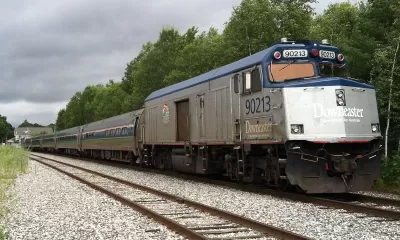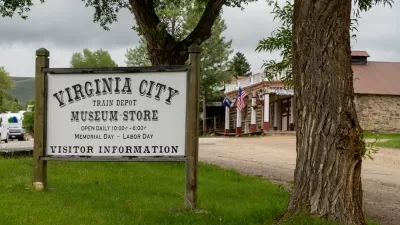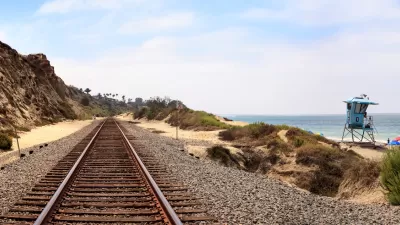As Amtrak gears up to plan expansion projects supported by new federal funding, states can take some advocacy lessons from Maine's popular Downeaster train.

Jake Blumgart describes "one of the most successful state-backed services in America’s passenger rail system" and evaluates how similar efforts could succeed in other states. Maine's Downeaster, which opened in 2001 after a decades-long campaign by the advocacy group TrainRiders Northeast, saw consistent ridership growth before the pandemic—and "[e]ven with ridership still reduced, in October the Downeaster was back to 68 percent of its passenger load of that same month in 2019."
The train has brought significant economic benefits and reduced congestion in communities that previously had little or no access to public transit. "The economic value of the Downeaster can be measured in 100,000 out-of-towners from 'down South' who arrive in the state without clogging the roadways, bringing an estimated $29 million in tourism revenue every year (pre-COVID-19)."
With Amtrak set to receive increased federal funding, advocates say states shouldn't assume they'll be part of expansion plans, but make an assertive case for their rail proposals. As Blumgart writes, "Maine may have been the first state to go to Amtrak with a proposed rail expansion — as opposed to a federal agency courting local lawmakers — but many others have done so since." Jim Mathews, president and CEO of the Rail Passengers Association, warns that launching new train services will be more challenging in today's "vituperative slash-and-burn atmosphere," but the Downeaster offers some useful lessons on how to push train projects forward.
FULL STORY: Maine Loves Its Train. Can Other States Follow in Its Tracks?

Maui's Vacation Rental Debate Turns Ugly
Verbal attacks, misinformation campaigns and fistfights plague a high-stakes debate to convert thousands of vacation rentals into long-term housing.

Planetizen Federal Action Tracker
A weekly monitor of how Trump’s orders and actions are impacting planners and planning in America.

San Francisco Suspends Traffic Calming Amidst Record Deaths
Citing “a challenging fiscal landscape,” the city will cease the program on the heels of 42 traffic deaths, including 24 pedestrians.

Defunct Pittsburgh Power Plant to Become Residential Tower
A decommissioned steam heat plant will be redeveloped into almost 100 affordable housing units.

Trump Prompts Restructuring of Transportation Research Board in “Unprecedented Overreach”
The TRB has eliminated more than half of its committees including those focused on climate, equity, and cities.

Amtrak Rolls Out New Orleans to Alabama “Mardi Gras” Train
The new service will operate morning and evening departures between Mobile and New Orleans.
Urban Design for Planners 1: Software Tools
This six-course series explores essential urban design concepts using open source software and equips planners with the tools they need to participate fully in the urban design process.
Planning for Universal Design
Learn the tools for implementing Universal Design in planning regulations.
Heyer Gruel & Associates PA
JM Goldson LLC
Custer County Colorado
City of Camden Redevelopment Agency
City of Astoria
Transportation Research & Education Center (TREC) at Portland State University
Jefferson Parish Government
Camden Redevelopment Agency
City of Claremont





























